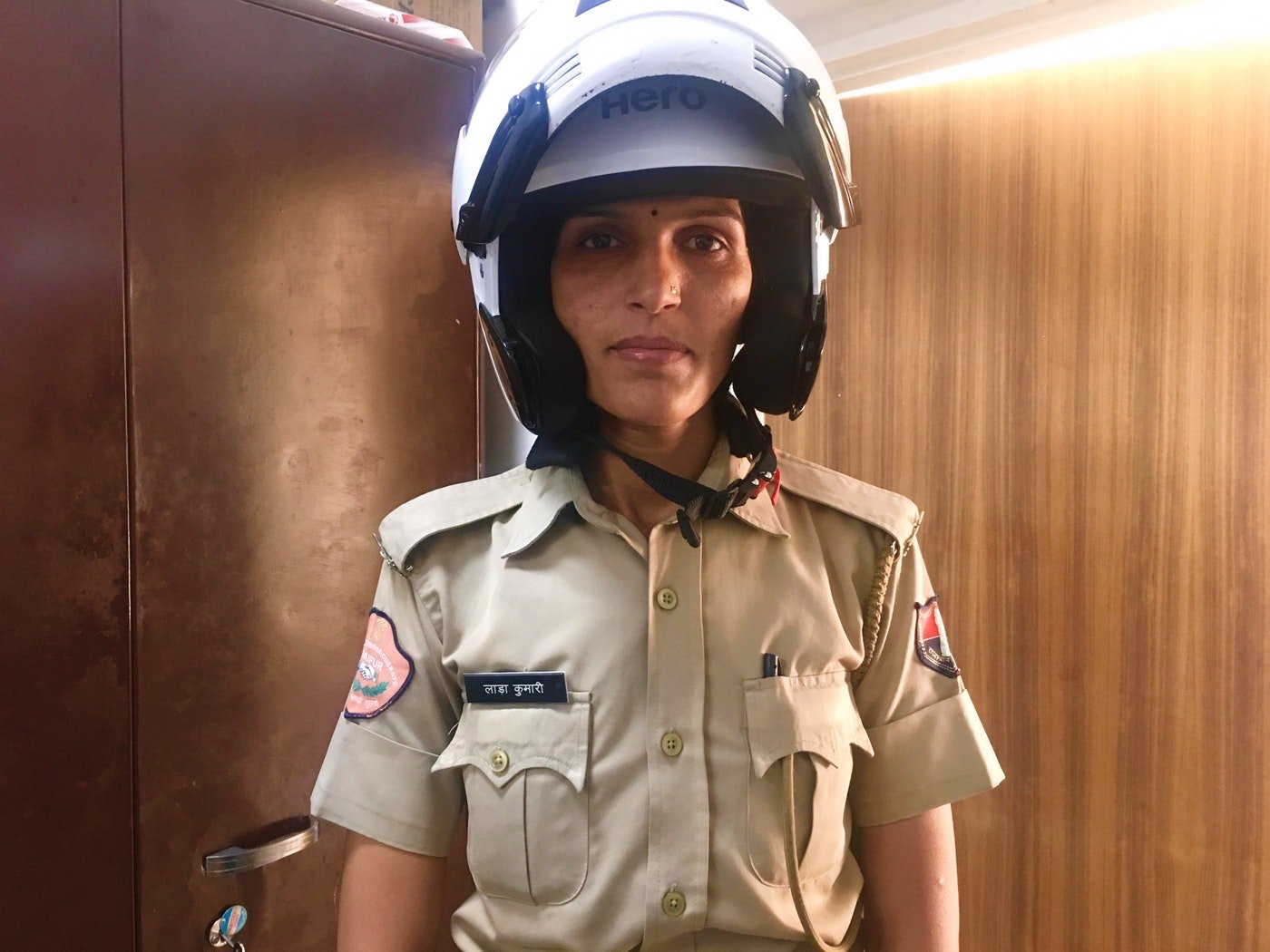This article first appeared in News Deeply. Written by Cristina Maza.
JAIPUR, INDIA — Lada Kumari, 28, was riding around the city of Jaipur, Rajasthan, on her motorbike when she saw a fight break out near the city’s Central Park. A girl in her late teens had gotten caught in the middle of a dispute between several young men after one of them tried to stop the others from harassing her. She looked frightened.
“I stopped my bike and broke up the fight,” Kumari says. “The girl went home and the boys stopped fighting.”
Kumari is one of 52 Jaipur policewomen who make up the city’s first all-female squad, launched in early May. The women are trained in martial arts and patrol the city of 3 million inhabitants in pairs. Their aim is to stop the harassment of women, known colloquially as “Eve-teasing.”
“The group [promotes] women’s safety,” explains Rajendra Singh, the superintendent of Jaipur’s main police commissariat. “They will patrol the most sensitive areas, like schools, parks, and malls.”
Read More: The Infuriating Reason Men Say They Catcall Women on the Street
Jaipur isn’t the first place in India to form a dedicated police squad to stop the harassment of women. This year, the state of Uttar Pradesh launched patrol groups made up of both male and female officers known as the “anti-Romeo” squads. But the squads were heavily criticized for allowing conservative social values to influence their work and intimidating young, unmarried couples.
In Jaipur, however, the authorities say their all-female squad will leave couples alone and focus on legitimate cases of harassment.
“The point is that a lot of girls don’t want to talk to male police officers when they have a problem,” says Pinku Rathore, a policewoman at the commissariat. “But women understand the problem – we know what Eve-teasing is.”

According to a recent survey by ActionAid UK, nearly four in five Indian women report having experienced harassment in public. Young women tell tales of being surrounded on their way to school or work by young men who grope or yell lewd comments at them. Some young men view this activity as innocent play. But increasingly, local officials are looking for ways to stop it.
So far, Jaipur residents seem happy with the police’s efforts to protect women.
“Men are often sitting in a circle or in a group on the street and teasing girls. We see this so many times. So if the police are making those men move, then that [signals] they are doing something wrong,” says Diya Naruka, a 17-year-old women’s rights advocate from Jaipur.
Kanoria College, an all-women’s school located across the highway from the University of Rajasthan, is one of the places where the new squad has started patrolling.
Antima Joshi, a 22-year-old art student, says she’s happy female officers are now protecting the area.
I think it’s a good idea for more women police to be deployed, because they understand the problem more than men do
Antima Joshi
But Ranju Mehda, the college’s vice-principal, says patrolling isn’t enough to stop harassment.
“If there is more patrolling, then men who harass women will be more scared because they know they can be caught. But that’s not a long-term solution, it’s just a first step,” Mehda says. “What we need to do is change the attitude of men.”
Mehda says change will begin with the way young men are raised to treat women. And in the meantime, experts say both male and female police officers should be trained to be more sensitive to gender issues.
“It doesn’t matter if you’re a man or a woman, it’s patriarchy that is there in the way you have been socialized,” says Nandita Bhatt, an expert on gender violence with India’s Participatory Research in Asia program. “So we need to have these conversations with male and female officers.”
Read More: This Girl Knows How to Handle a Street-Harasser
Jaipur has around 60 police stations, four of which are specifically dedicated to women’s issues. The women’s police stations are in charge of everything from disputes over dowries to sexual harassment. But while all police stations have a desk where women can bring their complaints, there aren’t always enough female officers to staff them, Singh admits.
Kamal Shekhawat, head of the control and command center in Jaipur’s commissariat, says many Indian women lack the means to join the police force.
“We have opened our gates and provided opportunities for women to work with us, but often they don’t have the resources [to study], and those welfare issues should be taken up by the government,” she says.
Nevertheless, Shekhawat says Jaipur’s commissariat plans to create more female squads in the near future.
“Soon, we would like to deploy 26 more teams of two officers each,” she says. “We have scooters to give them, and we’ll send them to the most sensitive areas in the city.”